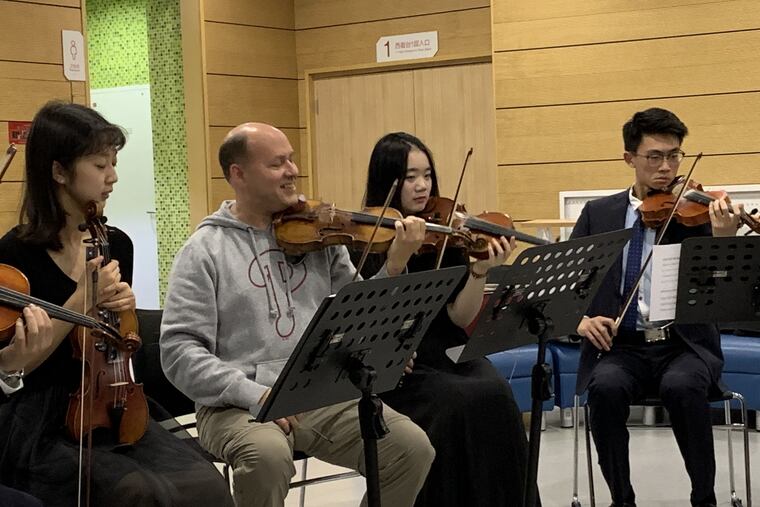Despite U.S.-Beijing tensions, Philadelphia Orchestra expands musical ties in China | Trudy Rubin
Philadelphia Orchestra's musicians build on their "rock star" reputation in China to teach, perform in Shanghai.

SHANGHAI — It was not the most auspicious moment for building people-to-people ties with China.
U.S. trade and tech wars with China were intensifying. Washington was rife with talk of a new U.S.-China Cold War and human-rights violations in Xinjiang. Even sports exchanges — that reliable standby of goodwill — had been drawn into politics by Beijing’s harsh reaction to a tweet by a midlevel NBA official in support of Hong Kong protests.
But here were four musicians from the Philadelphia Orchestra, just off a full orchestra tour of Taiwan, Japan, and South Korea, arriving in Shanghai to teach and play at ShanghaiTech University along with musicians from the Shanghai Philharmonic.
Could music still survive as an apolitical bridge between citizens of two countries that have become strategic competitors and view each other with rising suspicion?
» READ MORE: Philadelphia Orchestra's music soothes U.S.-China tensions
When it comes to the Philadelphia Orchestra — the answer is yes, with some caveats. In fact, the orchestra’s efforts are more important than ever as the United States and China drift further apart.
That’s because the orchestra’s rock-star status in China offers it unique possibilities for bridge-building. Even youngsters are aware that, in 1973, it was the first Western orchestra to play in the People’s Republic of China. It has made 11 full visits since then, the most recent one in May.
“We meet third- and fourth-generation Chinese who remember that visit,” said the orchestra’s CEO, Matias Tarnopolsky, in Shanghai. “We’re the custodians of this relationship.
“Every time we are here it has a slightly different flavor, with our musicians going into the community, playing in hospitals, working with students or with Chinese folk musicians. This creates a bond that ties the orchestra to many institutions in China.”
The latest ties include a planned a three-way, three-year partnership with the Shanghai Philharmonic and ShanghaiTech, a stunning new university with trees and a stream winding between glass-fronted buildings. The university has a Philadelphia connection: Its president, Jiang Mianheng, has a Ph.D. from Drexel University. He is also the son of former Chinese President Jiang Zemin.
The orchestra’s principal cellist, Hai-Ye Ni, one of the four visiting musicians, is also a link between Philly and Shanghai. She was raised in the city, home to the oldest classical symphony orchestra in China, founded in 1879. Ni moved to the United States as a teenager but now feels like an ambassador to her birthplace. “I feel music is the universal language of the world,” she says.
Indeed, it is fascinating to watch the passion with which many Chinese embrace classical music. “Living standards have risen, so people want to enrich their life,” says Zhiyuan Zhu, vice president of the university. “It is popular for youngsters to play an instrument.”
That enthusiasm for Western music extends to ShanghaiTech, where science students have formed a student symphony, even though music is not currently taught here. Their conductor is a postgraduate student and they squeeze in practice once a week. So they were visibly enthusiastic when cellist Ni, violist Meng Wang, and violinists Mei Ching Huang and Paul Roby sat down to coach them after a halting performance of Benjamin Britten’s “Simple Symphony.”
“I firmly believe music ties people together,” exulted student violinist Yinqing Yao, a 21-year-old computer scientist, after the lesson. (He started studying violin at 5 but was instructed by his parents to become an engineer.)
Philadelphia violist Wang, also Chinese-born, told students that when he attended the Beijing Conservatory, students slept 11 to a hot, sweaty room, shared one bathroom, and had to buy a ticket to a public shower.
How things have changed. The new Zhejiang Conservatory of Music, near Shanghai, reportedly contains nine concert halls and has room for 5,000 students. Clearly, Chinese officials expect a rising demand for classical music. (Note: The Philadelphia Orchestra also offers seminars on orchestra management and how to fill new concert halls.)
When the Philadelphia Orchestra members gave a chamber music concert at ShanghaiTech alongside counterparts from the Shanghai Philharmonic, 600 students and faculty competed for 300 seats.
But what does this tell us about the bigger picture and whether the orchestra’s efforts to build diverse connections in China can manage to avoid all political traps?
» READ MORE: Like the Sixers, the Philadelphia Orchestra has a Chinese engagement
“Politics is not affecting what we do here,” insists Tarnopolsky. He hopes the strategic partnership with ShanghaiTech can flow two ways, even expanding into melding technology with music.
“We do avoid politics, but we are very aware of what is going on,” he says. “We believe music can make some basic human connections that are pretty well absent from other forums.”
He is correct, which is why I think the orchestra’s efforts are so important (though it may be tough to avoid being caught in political crosscurrents).
At a time of rising paranoia in both countries, it would be dangerous if cultural and educational ties were severed. Given its stellar brand -- and music’s universal language -- the Philadelphia Orchestra stands a strong chance of bucking the trend.